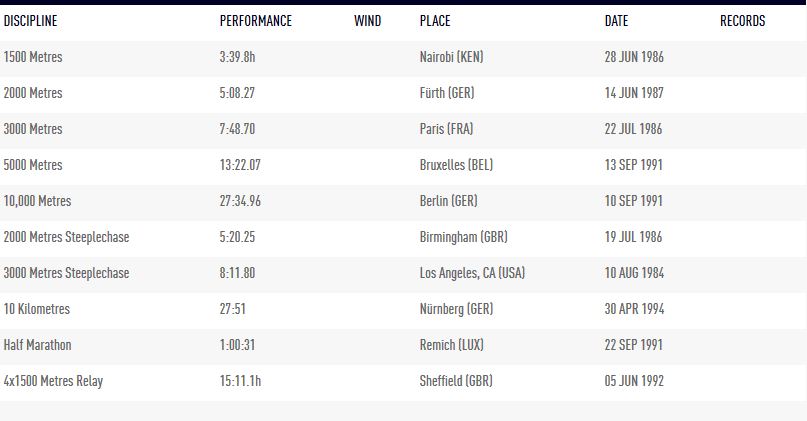
Korir ran a blistering last 200m to leave the others gasping for breath
The period between 1981 and 1986 was a dry spell for Kenyan athletics. During this period Kenyan athletes did not win any gold medals at global events such as the Olympics, the world athletics championships, the Commonwealth games or the world cross country championships.
The only global champion during this period was Julius Korir who won gold medals at the 1982 Commonwealth games and then shocked the world by winning the gold medal at the 1984 Olympics.
His running career begun to take shape when he joined the Kenya army in 1979. In those days, the army was the vehicle by which many of Kenya’s top running talents sharpened their running skills.
At the 1982 African athletics championships, he took the silver medal in the steeplechase behind Ethiopian Eshetu Tura. Compatriot Joshua Kipkemboi took bronze.
He continued to work hard and raise his game. n September of 1982, he went to the 1982 Commonwealth games. At this time, Kenya athletics was in a downward spiral. Having boycotted the 1976 and 1980 Olympics, Kenyan athletics had lost its edge. Kenya’s performance was below par. The bright spot was Korir who won Kenya’s sole gold medal, winning the 3000m steeplechase.
He won by beating the heavily favoured Graeme Fell of England in the final.
Race Video
Julius Korir in the NCAA
Korir would then leave the country to pursue a running scholarship at Washington State University in 1982. It was a college that was notable for recruiting top tier Kenyans, most notably Henry Rono who became a legend there in the late 1970s.
His college running career was stellar. He won the 5000m at the 1984 NCAA championships. He would then win the 3000m steeplechase at the 1986 NCAA championships. Prior to that, he had finished second twice in the NCAA 3000m steeplechase. In 1983, as a freshman, he finished second behind Brian Diemer and in 1984 he was second to Farley Gerber.
Julius Korir at the 1984 Olympics
Not much was expected from the Kenyan contingent to the 1984 Olympics. Not even from Korir. he had finished 7th at the 1983 world athletics championships. The 3000m steeplechase was going to be tough. He was far from the favourite. The athlete who was getting most of the publicity was Henry Marsh, who was favoured. He was a vastly experienced and supremely tactical runner. Also in the race was another American Brian Diemer who had beaten Korir at the 1983 NCAA championships. Then there was the Frenchman Joseph Mahmoud who had finished fourth at the 1983 world athletics championships. he ran the fastest time of 1984, clocking 8:07.62 in Brussels.
In a highly tactical race, the lead changed hands multiple times until the last lap when Korir went to the front, closely followed by Marsh who looked poised to make his move. Korir held on until 200m were left. At this time he suddenly accelerated leaving the rest of the field in his wake. No one had answer for Korir’s sudden kick. Mahmoud tried to give chase but he did not have enough left in the tank. Marsh staggered at the end and was passed by Diemer who pipped him to take bronze. Korir won in a commanding fashion, finishing at least ten metres ahead of the rest of the field. He clocked 8:11.80 which remained his personal best
Prior to the games, yours truly remembers commentators on TV and radio going on endlessly about Henry Marsh. The chatter was even higher in the USA where Korir was still pursuing his college running career. Korir later said that the constant mention of Marsh that motivated hm to work hard at preparing for the games.
Race Video
Julius Korir Video Profile
Julius Korir Later Years (road career)
His career petered out after he won the 1986 NCAA championships. This was due to knee injuries mostly accumulated while running in the NCAA. The NCAA circuit is very demanding and exceptional runners like Korir are often called upon to run in multiple races because this helps their school accumulate points. The net result of all this over-racing is stress related injuries. Many of the Kenyans who ran in the NCAA especially in the 1980s had very short careers.
Later on he embarked on a road racing career. He recorded impressive times including a 27:51 for the 10K and 60 minutes for the half marathon.
Julius Korir Personal Bests

| Back to Kenya Athletics Page |
